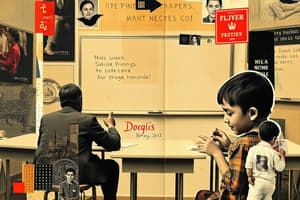Podcast
Questions and Answers
What is Classroom Management?
What is Classroom Management?
Consists of the practices and procedures a teacher uses to maintain the environment in which instruction and learning can take place.
Why does Classroom Management matter?
Why does Classroom Management matter?
- It is unrelated to student success.
- It helps to improve academic engagement. (correct)
- It has no impact on instructional time.
- It is the least common request for assistance.
What are the Traditional Reactive Responses to Discipline?
What are the Traditional Reactive Responses to Discipline?
Increased surveillance, emphasis on rules, sanctions and punishment, exclusion of students with disabilities.
What is the Reality of Reactive Responses?
What is the Reality of Reactive Responses?
What does research say about reducing behavior problems?
What does research say about reducing behavior problems?
What does PBIS stand for?
What does PBIS stand for?
What are the Tier 1 Basics in PBIS?
What are the Tier 1 Basics in PBIS?
Why is it important to teach Clear Expectations?
Why is it important to teach Clear Expectations?
What are Types of Feedback?
What are Types of Feedback?
What is the rationale for reinforcing behavior?
What is the rationale for reinforcing behavior?
What are recent trends/procedures for monitoring behavior?
What are recent trends/procedures for monitoring behavior?
Flashcards are hidden until you start studying
Study Notes
Classroom Management Fundamentals
- Classroom Management involves the practices and procedures teachers utilize to create an effective learning environment.
- Effective management hinges on the actions of teachers rather than the behavior of students, focusing heavily on establishing procedures and routines.
Importance of Classroom Management
- Teachers frequently seek assistance with Classroom Management, which is linked to student success and academic performance.
- Ineffective Classroom Management can lead to lost instructional time and reduced student engagement.
- Approximately 6-12% of students may experience Emotional/Behavioral Disabilities (EBD) in any given class, with a cumulative 25% over a student's academic career.
Traditional Discipline Approaches
- Reactive discipline strategies often emphasize increased surveillance, strict rules, and punitive measures.
- These methods may inadvertently exclude students with disabilities and those facing behavioral challenges.
Limitations of Reactive Responses
- Short-term solutions often reduce serious problem behavior but can foster negative school climates and power struggles.
- Such approaches may worsen anti-social behaviors for students with histories of severe issues.
Effective Behavior Management Research
- Punishment and exclusion need to be supplemented with proactive support systems to be effective.
- Quality instruction is associated with a decrease in behavioral problems.
- Comprehensive school-wide behavior support strategies can lower disruptive incidents.
Paradigm Shift in Discipline
- Movement from traditional reactive approaches to data-driven, proactive methodologies is essential.
- Implementing comprehensive three-tiered prevention models transforms the instructional approach to behavior.
PBIS Overview
- Positive Behavioral Interventions and Supports (PBIS) is a systematic framework for teaching, reinforcing, and monitoring behavior.
- Interventions are categorized into Universal (80-90%), Targeted Group (10-15%), and Intensive Individual (1-5%).
Tier 1: PBIS Basics
- Tier 1 serves all students, incorporating proactive and reactive strategies to prevent harm.
- Core components focus on establishing a positive environment, organizing classroom space, and utilizing evidence-based instruction.
Clear Expectations in Behavior
- Expectations for behavior and learning must be explicitly taught, modeled, and reinforced.
- Clarity in expectations fosters safe learning environments and helps students who may lack these teachings at home.
Instructional Approach to Behavior
- Implements structured support for faculty/staff and students via manuals, development initiatives, and community outreach.
Feedback as Reinforcement
- Effective feedback acts as reinforcement and plays a crucial role in boosting student performance and intrinsic motivation.
- Properly administered praise enhances students' feelings of self-efficacy, leading them to be more persistent in their efforts.
Types of Effective Feedback
- Feedback should be sincere and specific; highly general praise is often ineffective.
- Process-focused feedback is generally more beneficial than person-focused, especially as students mature.
Procedures for Reinforcing Positive Behavior
- Includes systems like ticket systems for rewards, allowing students to exchange for tangible or intangible items.
Rationale for Reinforcing Positive Behavior
- Success leads to further success, particularly crucial for academically or behaviorally struggling students.
Trends in Monitoring Behavior
- Traditional monitoring techniques include attendance records and discipline referrals, categorized by responsiveness and risk.
- Contemporary methods utilize systematic behavioral screeners, akin to benchmark assessments, to identify students with behavioral issues.
Tier 2: PBIS Focus
- Tier 2 emphasizes more intensive strategies specifically designed to assist students exhibiting existing behavioral problems.
Studying That Suits You
Use AI to generate personalized quizzes and flashcards to suit your learning preferences.




